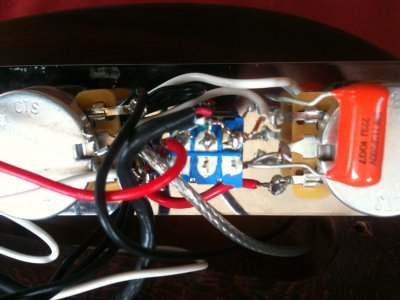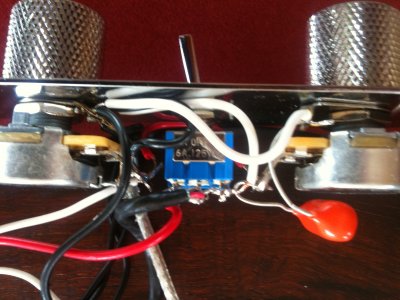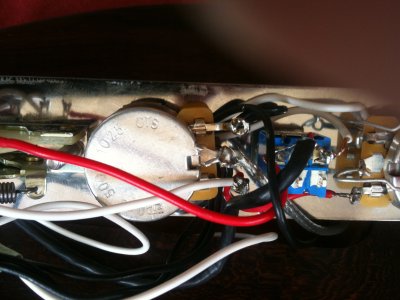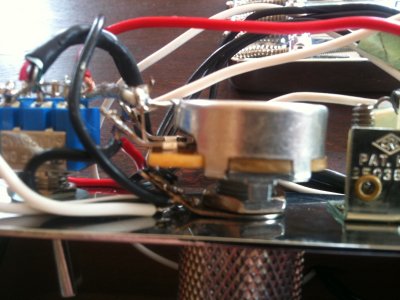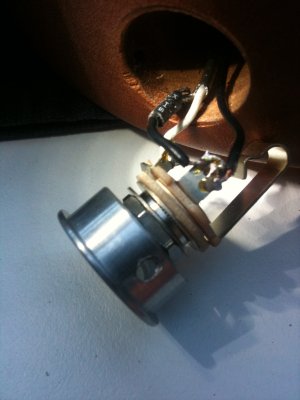
You are using an out of date browser. It may not display this or other websites correctly.
You should upgrade or use an alternative browser.
You should upgrade or use an alternative browser.
Should I shield my H-S-H strat?
- Thread starter ORCRiST
- Start date
Cagey
Mythical Status
- Messages
- 24,425
I've gone further than that and desoldered the original wires to attach shielded cable directly, since splices aren't the best thing to have. But, with single coil pickups, they're noisy enough on their own that shielding their leads doesn't help very much, if at all.
The problem is a single coil pickup is essentially a mile-long antenna. Shielding the last 6 inches or so is kinda like trying to bail out the Titanic with a coffee cup. It's also why shielding the cavity has no measurable effect. The pickup (antenna) is still exposed, and it necessarily pokes through a hole that means nothing inside is shielded, either. That's why there's been so much effort expended in trying to create noiseless vertically-oriented pickups. Fortunately, they've been pretty successful. There's really no good reason to use old-fashioned single-coil pickups any more. Granted, they don't all sound great, but a good many of them are at least serviceable, and some are really very good. I know I'll never go back to regular single coils, just like I'll never go back to using ice boxes for cooling or horses for transportation, unless I'm on a camping trip with an urge to punish myself <grin>
The problem is a single coil pickup is essentially a mile-long antenna. Shielding the last 6 inches or so is kinda like trying to bail out the Titanic with a coffee cup. It's also why shielding the cavity has no measurable effect. The pickup (antenna) is still exposed, and it necessarily pokes through a hole that means nothing inside is shielded, either. That's why there's been so much effort expended in trying to create noiseless vertically-oriented pickups. Fortunately, they've been pretty successful. There's really no good reason to use old-fashioned single-coil pickups any more. Granted, they don't all sound great, but a good many of them are at least serviceable, and some are really very good. I know I'll never go back to regular single coils, just like I'll never go back to using ice boxes for cooling or horses for transportation, unless I'm on a camping trip with an urge to punish myself <grin>
Cagey
Mythical Status
- Messages
- 24,425
There are a great many urban legends regarding guitars (and other instruments) out there. Some of them are loosely based in fact, so their credibility is seemingly infallible as long as it's not examined too closely. But, many of them have to do with imitation and superstition, and not a little exaggeration. "If so-and-so did (or didn't do) it, and he's rich and famous, it must be a Good Thing" or "If it's not shielded, it'll pick up noise, so shielding the living snot out of it must be a Good Thing". Has nothing to do with fact, it's a logical fallacy called "Post hoc ergo propter hoc", Latin for "after this, therefore because of this", which states "Since that event followed this one, that event must have been caused by this one." A great many products are sold that way. Can you imagine if Jesus were alive today, and it became known that he wore "Fruit of the Loom" boxers? Hanes would have to fold up their tent. Or, how about since the fact that hot air is lighter than relatively cool air, putting heaters in your tires ought to result in better mileage, since you'd lower the friction caused by too much weight in contact with the road. Silly, right? Yet, some people will argue with religious fervor that lacquer sounds better than polyurethane on electric guitars.
If you want to know about electrical noise, you don't ask a butcher, a baker or a candlestick maker. You talk to an electrical engineer. Not that the former hasn't had some experience with electrical noise; most people have, whether they know it or not. And if they did know about it, and did something that seemed to mitigate it, that may become the go-to solution for others who are having the problem and don't know why or what to do about it.
I guess what I'm saying is "question everything". And even if 99 people say the same thing and 1 says something else, investigate it. Science has nothing to do with popularity or consensus. You have to get the facts, and get your mind right.
If you want to know about electrical noise, you don't ask a butcher, a baker or a candlestick maker. You talk to an electrical engineer. Not that the former hasn't had some experience with electrical noise; most people have, whether they know it or not. And if they did know about it, and did something that seemed to mitigate it, that may become the go-to solution for others who are having the problem and don't know why or what to do about it.
I guess what I'm saying is "question everything". And even if 99 people say the same thing and 1 says something else, investigate it. Science has nothing to do with popularity or consensus. You have to get the facts, and get your mind right.
I soldered a short length of wire to braid on shielded wire and soldered the other end to ground ring(I use this instead of soldering to pot).unfortunately I got no sound out of amp.when I detached this short length,pickups work again(though is bit noisy).why did this happen?
photos attached. am unsure why Im getting this hum/noise when strings untouched. equally bad whether humbucker or single p/ups selected. any criticism welcome. which wires(besides hot to jack) should be changed to shielded. hope not too crowded to make sense.thanks
Attachments
Cagey
Mythical Status
- Messages
- 24,425
I suspect what's going on is a coincidence. It's not grounding the sheild that's hurting you, it's that monster-sized capacitor's hot lead shorting out to the pot body when you reinstall the control plate.
One of the biggest myths in the guitar world is that one type of capacitor sounds different or better than another of the different type even if they are the same value. Problem is, capacitors are sloppy devices, so the chances of two of them sounding the same are slim to none even if they're the same type. It's not the type that changes the response, it's the variation in the capacitance that does it. Then, there's no sense putting a 250 volt or 600 volt device in a circuit that will never see more than a hundred millivolts or so. So, the little ceramic parts are just fine.
Not that there's anything wrong with big, fluffy caps with outrageous specs, but they're unnecessary in the extreme, expensive, and physically difficult to deal with.
Wrap some tape around those capacitor leads or put some insulated sleeving on them, and I'll wager your problem goes away. If you don't have any sleeving, you can often just strip off an inch or two of it from a piece of wire and slide it on there.
Also, I didn't see your output jack in the pictures, so I don't understand your comment about shielding it, but it definitely needs it if it doesn't have it.
One of the biggest myths in the guitar world is that one type of capacitor sounds different or better than another of the different type even if they are the same value. Problem is, capacitors are sloppy devices, so the chances of two of them sounding the same are slim to none even if they're the same type. It's not the type that changes the response, it's the variation in the capacitance that does it. Then, there's no sense putting a 250 volt or 600 volt device in a circuit that will never see more than a hundred millivolts or so. So, the little ceramic parts are just fine.
Not that there's anything wrong with big, fluffy caps with outrageous specs, but they're unnecessary in the extreme, expensive, and physically difficult to deal with.
Wrap some tape around those capacitor leads or put some insulated sleeving on them, and I'll wager your problem goes away. If you don't have any sleeving, you can often just strip off an inch or two of it from a piece of wire and slide it on there.
Also, I didn't see your output jack in the pictures, so I don't understand your comment about shielding it, but it definitely needs it if it doesn't have it.
thanks for getting back,Cagey. Covered capacitor leads as suggested. grounded shield (see photo). Now very quiet. Unfortunately cant heart guitar at all. Disconnected shield ground and can now hear amp but same prob of background noise when strings untouched. what u think?
Attachments
Cagey
Mythical Status
- Messages
- 24,425
My main big-screen computer has been down all week, my other big-screen computer is a Windows machine that isn't allowed on the 'net, so I've been forced to use my netbook. As a result, I can't really see the pictures you took very well since they're 6 or 8 times my screen size. But, I'm sure that shield you're grounding has to be connected to the signal somewhere along its length. It may be a wiring error, it may be a short, or it may be that in the process of soldering the signal line you melted through the insulation that separates the internal signal line from the outside shield. That happens a lot with under-powered soldering irons and/or pointed conical tips.
So, you have to find where one of those things happened. Otherwise, you won't be able to ground your shielding, and the guitar is going to be noisy.
So, you have to find where one of those things happened. Otherwise, you won't be able to ground your shielding, and the guitar is going to be noisy.
Cagey
Mythical Status
- Messages
- 24,425
If it's touching something it shouldn't, then yes. If it's shorted internally, then no. If the other end isn't clear of the signal source, it won't. You should be able to see if there's anyplace it could touch something it shouldn't, though.
If you have access to an ohmmeter/multimeter, you should be able to measure between the shield and the signal line to see if there's a short. If so, just look along the length of the wire. Somewhere, it ought to be apparent where the short is.
If you have access to an ohmmeter/multimeter, you should be able to measure between the shield and the signal line to see if there's a short. If so, just look along the length of the wire. Somewhere, it ought to be apparent where the short is.
Well, I covered shielded wire with shrink tube, regrounded it at jack and all pickups working but background noise still there. Ordered a meter so hopefully will be able to investigate further. what else should I look for as cause. ie if I gently shake wire and hear noise - does this mean its an issue. what about ground wires, can they touch control plate.( when your computer back up, might be able to see this in photo). anything else. thanks.
Similar threads
- Replies
- 11
- Views
- 576
- Replies
- 8
- Views
- 743
- Replies
- 46
- Views
- 5K
- Replies
- 18
- Views
- 2K


